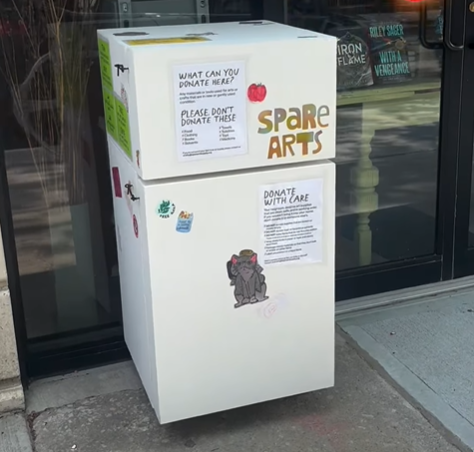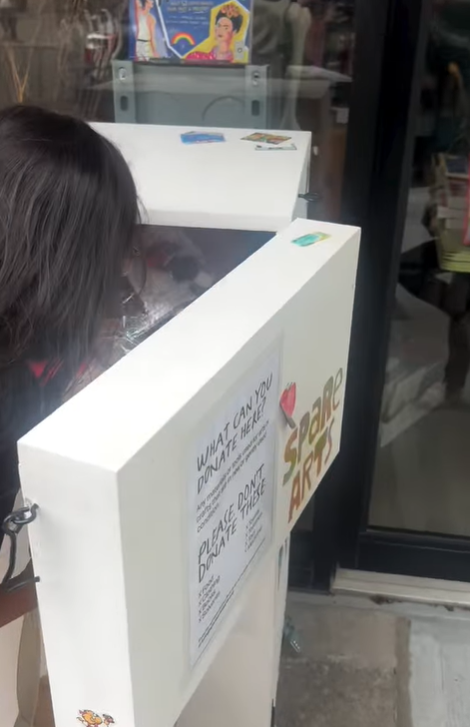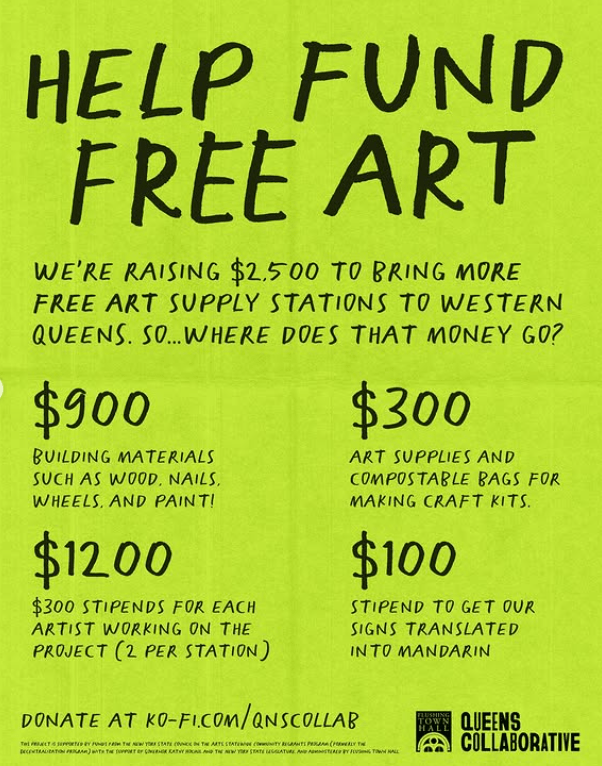
The Spare Arts Initiative fills fridges with gently used materials to inspire creativity across Western Queens. Via @qnscollaborative on Instagram
July 9, 2025 By Jessica Militello
Astorians can now tap into their creativity without breaking the bank, thanks to Queens Collaborative’s new Spare Arts Initiative, a mutual aid project designed to make art accessible to everyone.
Launched at the end of last month, the initiative introduces community “art fridges” stocked with donated art supplies at various locations throughout Western Queens. The supplies—ranging from paints and markers to fabric, magazines, and Sculpey—come from local artists who no longer need them but want to pass them on.
The idea grew out of Queens Collaborative’s long-running practice of accepting new and gently used art materials. Over time, the volume of donations grew, along with requests from community members looking to give or receive supplies. The team had often set up an outdoor table to distribute items, but with increasing demand, they needed a more sustainable solution.
“We iterated on the long sort of history of little free libraries and things like that, and we used that model as a way to imagine how people interact with sharing their lives with each other without us having to act as the intermediary and hosting a big event every time,” said Kels Bower, an organizing partner at Queens Collaborative.

Visitors can grab supplies or leave their own at this community art fridge, part of a growing mutual aid project. Via @qnscollaborative on Instagram
Art fridges are now available at:
-
Pancakes Records – 34-08 31st Ave., Astoria, NY 11106
-
Astoria Food Pantry – 25-82 Steinway St., Astoria, NY 11103
-
Astoria Bookshop – 31-29 31st St., Astoria, NY 11106
-
Art Strong NYC – 43-67 11th St., Long Island City, NY 11101
The supplies are free to take, and while swaps are encouraged, they are not required to participate.“One of the things that we are trying to make people understand is that many things can be a craft supply,” said Bower. “A lot of people ask, ‘Is it okay if I donate this? It’s not technically a fine art item,’ and the answer is if someone could use it to craft with, then it is. We’re trying to broaden the definition of what is or isn’t art or creative tools.”
In addition to donated materials, Queens Collaborative has teamed up with local artists to create beginner-friendly arts and crafts kits, especially for people new to the creative world. One of those artists, Maritza Rico, serves on the board of Astoria Food Pantry and also leads crochet workshops at the Collaboratory.
“The kit component is low-barrier and low-entry craft kits for people who might want to be crafty but might not have all the skills or the supplies they need,” said Rico. “In the kit, you have very straightforward instructions and all the items that they might need to make something and feel creative, make something beautiful, and have fun for a few hours.”
Each kit is made from donated supplies and includes: Step-by-step instructions, background on the artist, information about the Spare Arts Initiative and guidance for how and what to donate.
Rico also helps manage the fridge at Astoria Bookshop, tailoring the kits to the business’s theme.
“Right now I’m managing one of the fridges along with another one of our artists, Alicia, for Astoria Bookshop, so the craft is a woven book work, because I wanted it to be sort of book-related.”
Find an Art Fridge Near You:
-
Pancakes Records – 34-08 31st Ave., Astoria, NY 11106
-
Astoria Food Pantry – 25-82 Steinway St., Astoria, NY 11103
-
Astoria Bookshop – 31-29 31st St., Astoria, NY 11106
-
Art Strong NYC – 43-67 11th St., Long Island City, NY 11101

To learn more about the Spare Arts Initiative, how to donate, or how to get involved, visit Queens Collaborative on Instagram for additional resources.
